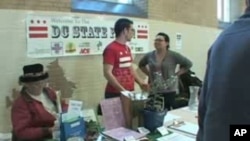As more Americans try to adopt healthy lifestyles and environmentally friendly practices, the idea of growing their own food has become increasingly popular among city dwellers. That interest was evident at a recent urban gardening forum in Washington, D.C. Dozens of organizations and hundreds of residents got together to advance the local food movement.
Katie Rehwaldt, a coordinator for Rooting DC, says getting free seeds is one of the benefits of participating in the day-long urban gardening forum.
“These are the seeds. We get about 36,000 pounds (16 metric tons ) of seeds packets a year donated to us, which otherwise are thrown away or destroyed. We distribute them to the civic garden projects all over the country.”
According to Rehwaldt, the purpose of Rooting D.C. is to bring community members together to learn about urban gardening and urban agriculture and to strengthen the community and develop more gardens all across the city.”
More than 550 people attended the 4th annual event.
“I think they recognize gardening as a way to bring fresh, local, organic foods into their lives, into their communities, into their schools," says Rehwaldt. "So I think the interest in gardening has spiked because of that.”
She says growing concern about the environment has also boosted interest. “Because we do not just grow food, but we protect the environment through sustainable gardening practices.”
A cooking demonstration of simple but healthy meals using fresh vegetables was one of the highlights of the various workshops offered by more than 30 local non-profit organizations.
“I am really interested in environment and sort of reconnecting with food and nature," says Scott Verman, a student of the American University in Washington, who came with his friends.
"Certainly how to find local food and how to cook it well, and maybe sort of hopefully to get involved on my own with gardening or inspire others to do so.”
Verman says his school has a community garden on campus. And for those who don’t have access to a large space, Dennis Chestnut of the urban gardening group, Groundwork Anacostia, says you don’t really need one.
“We can grow our food in as small a space as a flower pot, but we work with residents to use spaces as small as three feet by three feet (0.9 meter)," he says. "So that is what we consider an ideal size for a small space garden.”
Several organizations that encourage school children to grow fruits and vegetables in creative and healthy ways also ran workshops at Rooting DC.
“We are making newspaper flowerpots," says Erin Gordon, who is with an after-school program called Kids Power. "And newspapers are biodegradable material, so students can make the pot and then either put it directly into the ground, or they can put it into another flower pot. Any vessel can be a vessel for growing vegetables.”
Alexis Baden-Mayer came to get information for her six-year-old daughter. “Two years ago we started a garden together at her school. So I need to figure out what resources there are in DC to support school gardens and helping us learn how to put one together.”
Brian Stewart, a data base administrator, says gardening is a hobby that he can enjoy with friends. “I got some great tips from the seeds saving workshop for saving seeds for next year. I am looking forward to having some seeds and being able to trade with friends”
The organizers hope to launch a movement that will grow into a sustainable local food system for healthy communities in Washington, around the country and across the globe.




